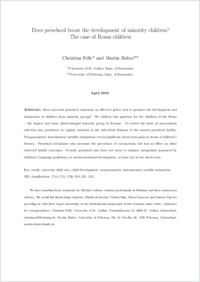Does preschool boost the development of minority children? : The case of Roma children
- Felfe, Christina University of St. Gallen
- Huber, Martin University of Fribourg
-
2016
Published in:
- Journal of the Royal Statistical Society: Series A (Statistics in Society). - 2016, vol. 180, no. 2, p. 475-502
English
Does universal preschool constitute an effective policy tool to promote the development and integration of children from minority groups? We address this question for the children of the Roma –the largest and most disadvantaged minority group in Europe. To tackle the issue of non-random selection into preschool, we exploit variation in the individual distance to the nearest preschool facility. Non- parametric instrumental variable estimations reveal significant short-term gains in terms of children’s literacy. Preschool attendance also increases the prevalence of vaccinations, but has no effect on other observed health outcomes. Overall, preschool also does not seem to enhance integration measured by children’s language proficiency or social-emotional development, at least not in the short-term.
- Faculty
- Faculté des sciences économiques et sociales et du management
- Department
- Département d'économie politique
- Language
-
- English
- Classification
- Economics
- Other electronic version
- License
-
License undefined
- Identifiers
-
- RERO DOC 323038
- DOI 10.1111/rssa.12207
- Persistent URL
- https://folia.unifr.ch/unifr/documents/307130
Statistics
Document views: 93
File downloads:
- Document: 283
